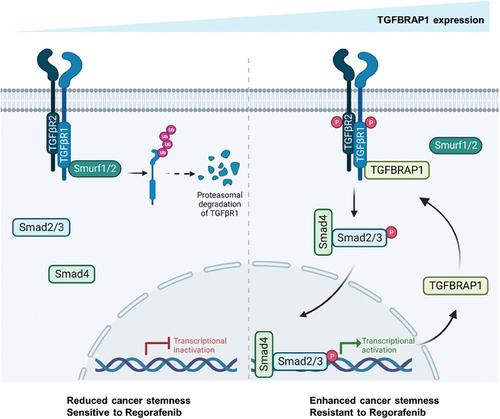Our official English website, www.x-mol.net, welcomes your
feedback! (Note: you will need to create a separate account there.)
Stabilization of TGF-β Receptor 1 by a Receptor-Associated Adaptor Dictates Feedback Activation of the TGF-β Signaling Pathway to Maintain Liver Cancer Stemness and Drug Resistance
Advanced Science ( IF 14.3 ) Pub Date : 2024-07-09 , DOI: 10.1002/advs.202402327
Kewei Liu 1, 2 , Fanxuan Tian 2 , Xu Chen 2, 3 , Biyin Liu 2 , Shuoran Tian 2 , Yongying Hou 2, 4 , Lei Wang 2 , Mengyi Han 2 , Shiying Peng 2, 3 , Yuting Tan 2, 3 , Yuwei Pan 2, 3 , Zhaole Chu 2 , Jinyang Li 2 , Linrong Che 2 , Dongfeng Chen 2 , Liangzhi Wen 2 , Zhongyi Qin 2 , Xianfeng Li 2 , Junyu Xiang 2 , Xiu-Wu Bian 5 , Qin Liu 2, 3, 5 , Xiaoli Ye 1 , Tao Wang 2 , Bin Wang 2, 5, 6
Advanced Science ( IF 14.3 ) Pub Date : 2024-07-09 , DOI: 10.1002/advs.202402327
Kewei Liu 1, 2 , Fanxuan Tian 2 , Xu Chen 2, 3 , Biyin Liu 2 , Shuoran Tian 2 , Yongying Hou 2, 4 , Lei Wang 2 , Mengyi Han 2 , Shiying Peng 2, 3 , Yuting Tan 2, 3 , Yuwei Pan 2, 3 , Zhaole Chu 2 , Jinyang Li 2 , Linrong Che 2 , Dongfeng Chen 2 , Liangzhi Wen 2 , Zhongyi Qin 2 , Xianfeng Li 2 , Junyu Xiang 2 , Xiu-Wu Bian 5 , Qin Liu 2, 3, 5 , Xiaoli Ye 1 , Tao Wang 2 , Bin Wang 2, 5, 6
Affiliation

|
Dysregulation of the transforming growth factor-β (TGF-β) signaling pathway regulates cancer stem cells (CSCs) and drug sensitivity, whereas it remains largely unknown how feedback regulatory mechanisms are hijacked to fuel drug-resistant CSCs. Through a genome-wide CRISPR activation screen utilizing stem-like drug-resistant properties as a readout, the TGF-β receptor-associated binding protein 1 (TGFBRAP1) is identified as a TGF-β-inducible positive feedback regulator that governs sensitivity to tyrosine kinase inhibitors (TKIs) and promotes liver cancer stemness. By interacting with and stabilizing the TGF-β receptor type 1 (TGFBR1), TGFBRAP1 plays an important role in potentiating TGF-β signaling. Mechanistically, TGFBRAP1 competes with E3 ubiquitin ligases Smurf1/2 for binding to TGFΒR1, leading to impaired receptor poly-ubiquitination and proteasomal degradation. Moreover, hyperactive TGF-β signaling in turn up-regulates TGFBRAP1 expression in drug-resistant CSC-like cells, thereby constituting a previously uncharacterized feedback mechanism to amplify TGF-β signaling. As such, TGFBRAP1 expression is correlated with TGFΒR1 levels and TGF-β signaling activity in hepatocellular carcinoma (HCC) tissues, as well as overall survival and disease recurrence in multiple HCC cohorts. Therapeutically, blocking TGFBRAP1-mediated stabilization of TGFBR1 by selective inhibitors alleviates Regorafenib resistance via reducing CSCs. Collectively, targeting feedback machinery of TGF-β signaling pathway may be an actionable approach to mitigate drug resistance and liver cancer stemness.
中文翻译:

受体相关接头对 TGF-β 受体 1 的稳定作用要求反馈激活 TGF-β 信号通路以维持肝癌干性和耐药性
转化生长因子-β (TGF-β) 信号通路的失调可调节癌症干细胞 (CSC) 和药物敏感性,但目前仍不清楚反馈调节机制是如何被劫持以促进耐药 CSC 的。通过利用茎样耐药特性作为读数的全基因组 CRISPR 激活筛选,TGF-β 受体相关结合蛋白 1 (TGFBRAP1) 被鉴定为 TGF-β 诱导的正反馈调节因子,可控制对酪氨酸的敏感性激酶抑制剂(TKI)并促进肝癌干细胞。通过与 1 型 TGF-β 受体 (TGFBR1) 相互作用并使其稳定,TGFBRAP1 在增强 TGF-β 信号转导方面发挥着重要作用。从机制上讲,TGFBRAP1 与 E3 泛素连接酶 Smurf1/2 竞争与 TGFBR1 的结合,导致受体多泛素化和蛋白酶体降解受损。此外,过度活跃的 TGF-β 信号传导反过来又上调耐药 CSC 样细胞中 TGFBRAP1 的表达,从而构成了一种以前未表征的反馈机制来放大 TGF-β 信号传导。因此,TGFBRAP1 表达与肝细胞癌 (HCC) 组织中的 TGFβR1 水平和 TGF-β 信号传导活性以及多个 HCC 队列中的总体生存率和疾病复发相关。在治疗上,通过选择性抑制剂阻断 TGFBRAP1 介导的 TGFBR1 稳定作用,可通过减少 CSC 来减轻瑞戈非尼耐药性。总的来说,靶向 TGF-β 信号通路的反馈机制可能是减轻耐药性和肝癌干细胞性的可行方法。
更新日期:2024-07-09
中文翻译:

受体相关接头对 TGF-β 受体 1 的稳定作用要求反馈激活 TGF-β 信号通路以维持肝癌干性和耐药性
转化生长因子-β (TGF-β) 信号通路的失调可调节癌症干细胞 (CSC) 和药物敏感性,但目前仍不清楚反馈调节机制是如何被劫持以促进耐药 CSC 的。通过利用茎样耐药特性作为读数的全基因组 CRISPR 激活筛选,TGF-β 受体相关结合蛋白 1 (TGFBRAP1) 被鉴定为 TGF-β 诱导的正反馈调节因子,可控制对酪氨酸的敏感性激酶抑制剂(TKI)并促进肝癌干细胞。通过与 1 型 TGF-β 受体 (TGFBR1) 相互作用并使其稳定,TGFBRAP1 在增强 TGF-β 信号转导方面发挥着重要作用。从机制上讲,TGFBRAP1 与 E3 泛素连接酶 Smurf1/2 竞争与 TGFBR1 的结合,导致受体多泛素化和蛋白酶体降解受损。此外,过度活跃的 TGF-β 信号传导反过来又上调耐药 CSC 样细胞中 TGFBRAP1 的表达,从而构成了一种以前未表征的反馈机制来放大 TGF-β 信号传导。因此,TGFBRAP1 表达与肝细胞癌 (HCC) 组织中的 TGFβR1 水平和 TGF-β 信号传导活性以及多个 HCC 队列中的总体生存率和疾病复发相关。在治疗上,通过选择性抑制剂阻断 TGFBRAP1 介导的 TGFBR1 稳定作用,可通过减少 CSC 来减轻瑞戈非尼耐药性。总的来说,靶向 TGF-β 信号通路的反馈机制可能是减轻耐药性和肝癌干细胞性的可行方法。

































 京公网安备 11010802027423号
京公网安备 11010802027423号